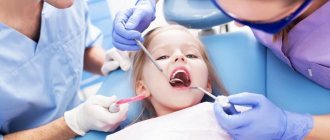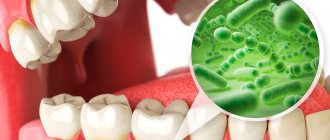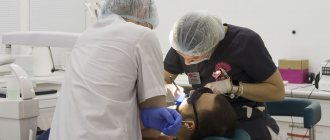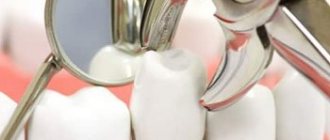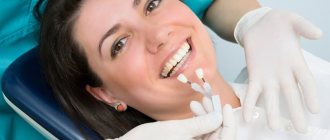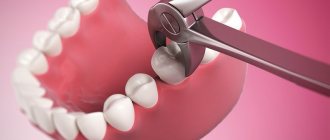Tooth loss is a disease in which, under the influence of negative factors, the integrity of the dentition is disrupted (due to the loss of one or more teeth). This disease is called edentulism.
Teeth are an important element of the human body. We lose them starting from childhood: healthy, strong teeth grow in place of lost milk teeth. Losing permanent teeth is a serious problem because a new tooth will not grow in the vacant space.
Caries
The most common cause of tooth loss is tooth decay. With this disease, the tooth crown is destroyed and the root system is weakened, as a result of which the tooth simply falls out. This happens if caries is not treated and oral hygiene is not maintained.
In this case, the tooth root, as a rule, remains in the bone tissue under the gum and if it is not removed in time, inflammation may develop.
To prevent tooth loss, you need to contact your dentist at the first signs of caries; these may be:
- the presence of carious cavities are dark spots on the tooth enamel. At the initial stage of the disease, they may not be present, or the patient may not see them on their own.
- pain when the tooth gets hot/cold, or sour, sweet or salty food and liquid;
- pain when pressing on the tooth and when chewing;
- bad breath;
- in the later stages - severe destruction of the crown.
Making a butterfly prosthesis
This method of prosthetics is the least reliable and comfortable. Therefore, such a prosthesis can be exclusively temporary. It solves aesthetic problems, but not functional ones. A removable denture is made of acrylic (plastic) or nylon. It has many disadvantages: the prosthesis is mobile, impairs diction, sometimes there are allergic reactions to the material from which it is made, it is not functional - it restores chewing function by less than 50%, and wears out quickly. But it is the most inexpensive. Therefore, the best use is to temporarily close the defect while the implant heals.
Periodontal disease
Periodontal disease is a disease that affects the gums and bone tissue around the tooth. With periodontal disease, atrophy of gum tissue occurs, so-called gum pockets are formed, and bacterial plaque is deposited in them, provoking further inflammation. The gums around the tooth shrink, exposing the lower part and, in some cases, the root. And the tooth itself gradually loosens and leaves the tooth socket.
Periodontal disease is often accompanied by inflammation, bad breath, sore gums, and increased tooth sensitivity.
But periodontal disease leads to tooth loss only in an advanced stage if measures are not taken for a long time. If you consult a doctor at the first signs of illness, unpleasant consequences can be avoided. And if you follow hygiene rules and do not overindulge in sweets, then the development of periodontal disease itself can be prevented.
Plants to help
To speed up healing and maintain good gum condition, herbalists recommend using Kalanchoe juice prepared at home - it contains a maximum of biologically active substances.
Growing Kalanchoe at home in a pot on a sunny window is not difficult. To obtain the healing juice of the plant, soak the washed leaves and stems for a week in the refrigerator at a temperature of 5–10 °C. This procedure increases the accumulation of useful substances in them. Then grind until smooth and squeeze out the juice, leave it at a temperature of 5–10 °C and filter. If necessary, you can preserve the juice with alcohol, bringing the strength of the solution to 20%. In this form, the drug can be stored for up to a year at a temperature not exceeding 10 °C. But, of course, fresh juice is preferable.
Kalanchoe juice has anti-inflammatory and regenerating effects. Moisten a clean gauze or cotton swab with it and apply to the gums for 20 minutes. In case of inflammatory processes and after surgery, the procedure should be repeated 3-4 times a day after meals, and for the purpose of prevention, 1 time a day is enough, but better in courses 2 times a day for 7-10 days in a row, combined with hydromassage under running warm water from soul.
The active substances of Kalanchoe not only destroy bacterial infection, but also exhibit antiviral activity. You can also rinse with this product by diluting the juice in half with boiled water.
Periodontitis
Periodontitis is an inflammation of the soft tissues of the oral cavity. If left untreated, it causes weakening of the ligamentous apparatus of the tooth. The gum becomes inflamed, destroyed, the fixation of the tooth in the socket is weakened, under the influence of regular chewing load it becomes loose and eventually falls out. Often with periodontitis, the tooth root is exposed.
Periodontitis causes not only poor oral health and bacteria, but also allergic reactions, gum injuries, hormonal imbalance, weakened immunity and a number of other reasons.
Moreover, if periodontitis is generalized, that is, spread over the entire jaw, the matter may not be limited to one lost tooth and other dental units will follow. If periodontitis is not treated at all, it can lead to complete edentia.
The first signs of the disease, for which you should go to the clinic, are bleeding gums, discomfort, and itching. This may be followed by pain when chewing, an unpleasant odor, and purulent discharge.
In severe periodontitis, the teeth become displaced and loosened, exposing the lower part of the tooth and the root. The disease should definitely not be brought to this stage, since it can only be cured through surgery.
Questions and answers
A year ago I received a serious facial injury, resulting in the loss of 2 front teeth on the upper jaw.
Good afternoon! A year ago I received a serious facial injury, which resulted in the loss of 2 front teeth on the upper jaw. The first is along with the root, but the root remains from the second. I am 43 years old, I live in Moscow. Will they be able to help me restore these teeth and how?
Hello! You can try to restore your teeth using express dental implantation or classic implantation; which method is right for you can be determined after an examination. There is also the option of restoring the dentition using classic dental prosthetics, but to determine whether this is possible in your case, again, an examination of the oral cavity and an x-ray are necessary. You can sign up for a free consultation with our specialists, where they will take an image and write out a treatment plan. Appointments can be made by calling +7 (495) 789-42-02 or. Sincerely, Patient Support Center SIMPLADENT++ 78
As a result of illness (fluorosis), he lost a large number of teeth. Orthopedists in our city offer removable dentures. Tell me, what prosthetic options are possible in my case?
As a result of illness (fluorosis), he lost a large number of teeth. Orthopedists in our city offer removable dentures. Tell me, what prosthetic options are possible in my case?
Hello! In your case, in order to recommend possible options for dental restoration, it is necessary to first analyze the image and also conduct an examination of the oral cavity. It is necessary to understand why you were not offered to have dental bridges or dentures on implants, why the orthopedist suggested that you install removable bridges. If you have such an opportunity, we suggest that you attend a free consultation at one of our clinics so that our doctors can conduct a direct examination, since a remote consultation still does not give the full picture. You can make an appointment with our specialists by calling the numbers listed below. Sincerely, Patient Support Center SIMPLADENT++ 78-800-333-53-41
Other questions
Other jobs
Age-related changes
If the main causes of adentia can be identified and neutralized in time, age-related tooth loss is an inevitable phenomenon. In old age, the immune system weakens, the gums atrophy and decrease in volume, the neck of the tooth becomes exposed, teeth become mobile and fall out.
Most often this happens at the age of 65-70, but if the patient did not take care of his teeth and did not follow preventive recommendations, negative consequences may appear earlier.
It is not possible to prevent this, but you can delay it by taking vitamins, medications that boost immunity, carefully monitor your physical condition and lead a healthy lifestyle.
Other Possible Causes
In addition to oral diseases, other factors can cause edentia:
- diabetes mellitus, in which blood sugar levels are abnormal, leading to excess glucose. This, in turn, provokes a disruption of the blood supply to the gum tissues, which weaken and the tooth falls out;
- heart diseases, in most cases requiring regular use of medications that disrupt the functions of mucous tissues, which also leads to loss of teeth;
- hypertension and other chronic diseases;
- mechanical injuries;
- metabolic disease;
- weakened immunity;
- poor diet, excessive sugar consumption;
- bad habits (smoking, excessive alcohol consumption, drug addiction);
- hereditary predisposition to adentia;
- failure to comply with hygiene standards and improper oral care, which provokes the growth of bacteria that weaken the gums and cause inflammation.
What can a doctor do?
Only the dentist and hygienist with a simple examination
can determine the presence or absence of periodontal disease. The essence of the study is to measure the periodontal pocket (for periodontitis) using a special probe and an x-ray. This method allows the doctor to quickly and painlessly assess the condition of your gums, propose a treatment plan to prevent further development of the disease, and develop a special self-hygiene regimen that will suit your specific situation.
How to prevent tooth loss
Preventing tooth loss is not so difficult; all you need to do is follow a few recommendations:
- Quitting smoking and alcohol.
- Normalization of diet, refusal of harmful foods, dyes, synthetic additives.
- Minimum sugar consumption or complete refusal of it.
- Avoiding sugary soda is the main enemy of healthy teeth.
- Maintaining hygiene means regularly brushing your teeth and rinsing with special solutions after meals.
- Regular professional cleaning of the oral cavity - removal of tartar and other deposits.
- If the immune system is weakened, take immunomodulators.
- Regular dental checkups.
If you have chronic diseases and other risk factors, you should pay increased attention to dental health and regularly visit a specialist. This will allow you to detect potential problems in time and eliminate them. But it is much simpler and cheaper than prosthetics.
Prevention
It is important not only to understand the causes of the problem, but also to have a good idea of how to prevent tooth loss. There are some simple recommendations:
- Visit your dentist regularly and be attentive to your health. Many oral diseases begin to manifest themselves at a very early stage.
- Give up bad habits. You will need to reduce the consumption of alcohol and cigarettes, or completely eliminate them.
- Be careful about the products you eat. The less fat, sugar, and dyes in food, the better.
- Maintain good oral hygiene. It is better to buy an electric toothbrush, water flosser, and floss. It is also worth visiting a dentist for professional cleaning and removal of hard plaque.
Since many problems appear with reduced immunity, it needs to be strengthened by all means.
If you do not want to face a problem such as tooth loss, contact our dentists. They are ready to conduct a preventive examination and address most health problems.
You can make regular appointments with us according to a previously drawn up schedule. We guarantee quality treatment at affordable prices.

